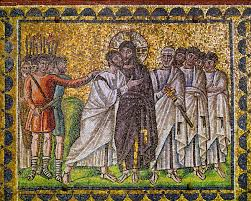Trust
I would recommend you listen to this broadcast of a sermon by Fr Peter Robinson SSPX, delivered on 14 August 2022, the Tenth Sunday after Pentecost.
https://youtu.be/COK-FAh_Xyk?t=2542
I find it helpful to take notes, they can more easily be use to refresh your memory. Here are my notes.
“In our world today, we are a little bit bankrupt on trust: trust is fragile, and it not easy to build it up. If you think about those with authority and power in today’s world, you will often think that trust has been broken. But we need to avoid cynicism: we should not lose the capacity for trust. We must have a very great trust in God, and in our fellow human beings by the design of God. We should not lose this trust because otherwise we become incapable of the supernatural virtue of hope. By hope we trust that the God will fulfil the promises He has made. They cannot be fulfilled in this life. We are not given eternal happiness up front, we have to trust. We have to trust that living according to the Catholic faith is the best road to happiness in this life, and that at death we will receive eternal happiness with God. The greatest activities we can do in this life are supernatural activities in the state of grace. We know that going against God can make things easy for us in this life, and being faithful to Him can make our lives here harder. We need a very great trust in God.
It is necessary by His will, that we trust other human beings. Not all of them, and not without judgment, but some things in this life cannot be accomplished without trust in our fellow man: e.g. the state of marriage. Marriage demands a great trust, for we pledge our lives to another person and pledge to be with them and have and raise children with them for the rest of your life. This is what God asks of us when He instituted marriage.
Trust and love go together: they are bound up. Without trust, you will be very careful of possible future problems, but the more you trust, the more you will do in reliance. Trust is the measure of love, and children learn trust through you and the relationship between parents. Children trust their parents –extremely so. And then the children become capable of marriage and committing themselves to another person. But if the parents do not treat their children well, they find it difficult to trust when they grow up.
For the salvation of your soul you need to trust other human beings: Our Lord only taught for three years, in a very specific geographical area. The rest of the time, God works through human instruments and He leaves it to us to judge who we trust. Perhaps you trusted your parents, or your religion teacher at school, who taught you, and you reached a moral certainty that this is the path to heaven.
God expects us to get the goods of family life and salvation through other people.
God is the one who first trusted. He trusted us to bring children into the world and care for them. God says to the priest, I give you my power to sanctify others an teach people the way to heaven. This is a great act of trust and we must be careful to use it well.
When trust works, so much good comes from it. When we are able to trust more in the good, we are able to receive more back. The less we trust, the less we can receive. We are stunted as human beings and cannot reach our perfection as human beings. A man and woman who trust each other, and their children, and their parish; this makes the children trusting, and leads to vocations – a child who decides to give their life to God – it is built on multiple layers of trust.
Take the example of investing in a company: the more you trust, the more you invest. Trust leads to commitment, leads to benefit for us. That is the way it is with our human condition. The more we can find something to trust, the more we can invest, and receive back.
To build trust you look for a certain consistency in a person: patterns of behaviour. This person I have known for so long is consistent, and I can expect that they will continue to act that way. Second, objectivity: how do they make decisions? On the basis of their feelings and desires, or because they look to a good outside themselves, no matter what it may cost them?
It is important to have a balance in the trust we give: there can be a defect or an excess of trust. When we see consistency and evidence that a person is trustworthy, we can nevertheless have a niggling doubt, and hold ourselves back. All trust involves risk. No trust in this world does not involve some risk.
But we cannot be absolutely independent. It is not Catholic, and it is not possible.
The other fault is trust without judgment: a gullible or naïve person who gives their heart too easily is making an error. We are never meant to stop thinking and judging, even with people whom we trust implicitly. God wants us to make the effort to find what we can trust, and then give our hearts, so that we can reap the greater benefits, and especially through human trust to come to a greater trust in God: Psalm 118 “supersperavi” I have super-hoped in You. You are my helper and my protector. In You I have super-hoped.
